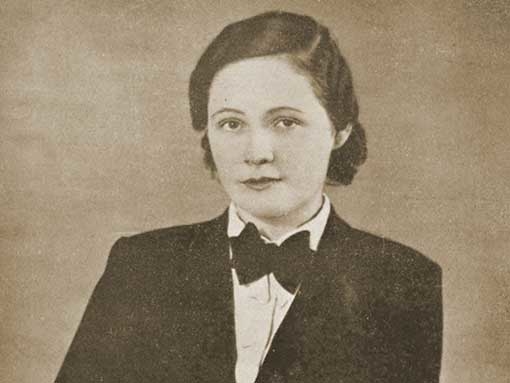She began to compose music already as a child, she had undeniable talent, during her short life, she won the acclaim of audiences and official recognition. The diminutive name Vitulka contradicts rather than resonates with confident orchestral compositions.
The life of composer Vítězslava Kaprálová (24 January 1915 Brno – 16 June 1940 Montpellier) is surrounded by legends concerning her relationship with Bohuslav Martinů and her premature death. She only lived for twenty-five years, she managed to write about forty compositions, she wrote a successful chorus Matičce (To the Mother) for the poem by Jan Neruda when she was only thirteen years old.
She received her musical foundations from her father, composer and pianist Václav Kaprál, the owner of the Musical School in Královo Pole. She studied conducting at the Brno Conservatory under Zdeněk Chalabala, composition under Vilém Petrželka. She graduated with the Koncert pro klavír a orchestr (Concerto for Piano and Orchestra), which she conducted; piano was played by Ludvík Kundera. She continued her studies at the Prague Conservatory under Václav Talich and Vítězslav Novák from 1935. She completed her studies with the Vojenská symfonieta (Military Symphonietta), the performance of which by the Czech Philharmonic she also conducted herself (26 November 1937). In Brno and Prague, it was the first time during these concerts that the orchestra was led by a woman.
In 1937, she met Bohuslav Martinů and under his influence, and based on the recommendations of Karl Boleslav Jirák, she decided to continue her studies in Paris. She was broadening her horizons, becoming familiar with the music of Igor Stravinsky, Sergei Pokofiev, Les Six; Martinů became her mentor and colleague. Among other things, Kaprálová also conducted his Koncert pro cemballo a orchestr (Concerto for Harpsichord and Orchestra). Together, they also leave in 1938 to attend the ISCM Festival in London where Kaprálová again conducts her Military Symphonietta, this time with the BBC Orchestra.
Vítězslava Kaprálová is on her way to worldwide success, but the occupation of Czechoslovakia begins in 1939, and World War II starts soon. The Elegy for violin and piano in memory of Karel Čapek is created, later the dark Concertino pro housle, klarinet a orchestr (Concertino for Violin, Clarinet and Orchestra). In early 1940, Rudolf Firkušný performs her Dubnová preludia (April's Prelude), in April Kaprálová marries Jiří Mucha. Soon afterwards, early signs of her illness begin to show, she is hospitalised in Paris, and later evacuated to Montpellier where she dies on 16 June 1940.
The double anniversary of Vítězslava Kaprálová – 100 years since her birth and 75 years since her death – is commemorated in Brno by four concerts:
19 January 2014 at 7:00 p.m., Brno Conservatory Hall
Compositions from the period of the studies. Organised by the Brno Conservatory and the Club of Moravian Composers
9 February 2015 at 7:00 p.m., Hall of the Vítězslava Kaprálová Art School
Compositions from her childhood and from the last period. Organised by the Company of Bohuslav Martinů and the Vítězslava Kaprálová Art School
17 February 2015 at 7:30 p.m., Besední dům
Compositions of Vítězslava Kaprálová. Organised by the Association of Friends of Music at the Brno Philharmonic
19 and 20 February 2015 at 7:30 p.m., Janáček Theatre
Vitulka – Concert for the 100th Anniversary. Organised by the Brno Philharmonic
The Society of Friends of Music also published a collection containing biographical data of Vítězslava Kaprálová and memories of her.































